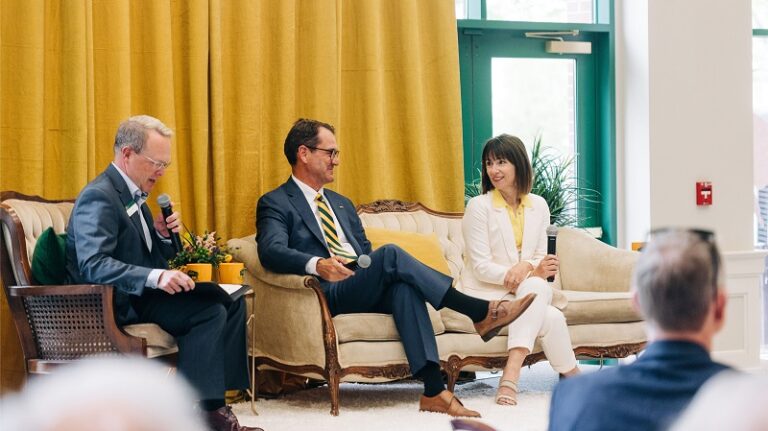Since its founding as North Dakota Agricultural College in 1890, 15 presidents have paved the way for excellence at NDSU.
Read MoreA President for Today, a University for the Future
NDSU President Dave Cook has been on the job only a few months, but he has a mission to transform the University so that it may be successful today and well into the future.
Story by Nicole Thom-Arens | Photos by Ann Arbor Miller | August 31, 2022
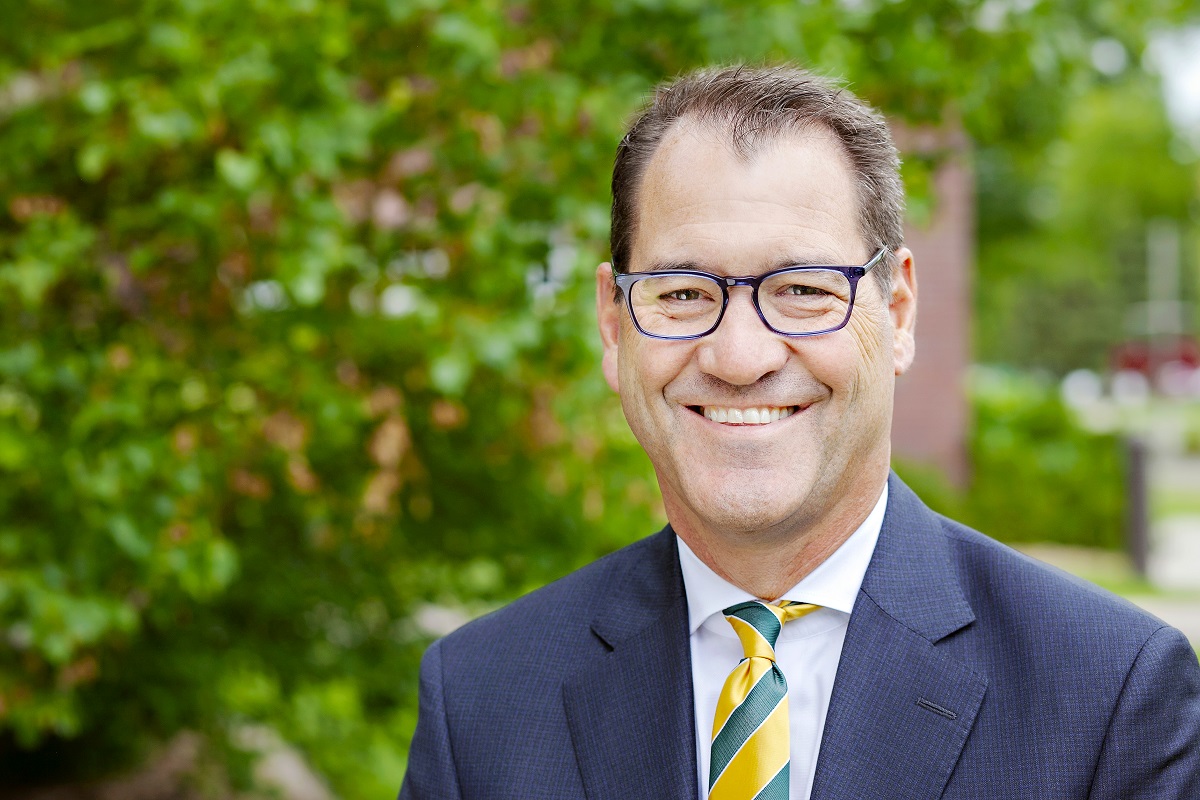
North Dakota State University’s 15th president, Dave Cook, has his eyes on the challenges and opportunities the University faces now and is committed to doing the right thing for the state’s 1862 land-grant university and its students. President Cook envisions NDSU as a place where research, workforce, and industry intersect to create “global masterpieces.”
“One big theme is going to be transforming. Not where we’ve been and not where we’ll be tomorrow but how can we address these challenges and do things we haven’t done before to reorganize, prioritize, and think about where we can go in the next 10 years and beyond,” President Cook said, previewing what we can expect to hear in his upcoming inaugural State of the University Address during Homecoming 2022.
The president has spent months — even before officially taking office — in conversations with University leaders, legislators, and community members so that he can understand where NDSU has been, where it is today, and possibilities for the future.
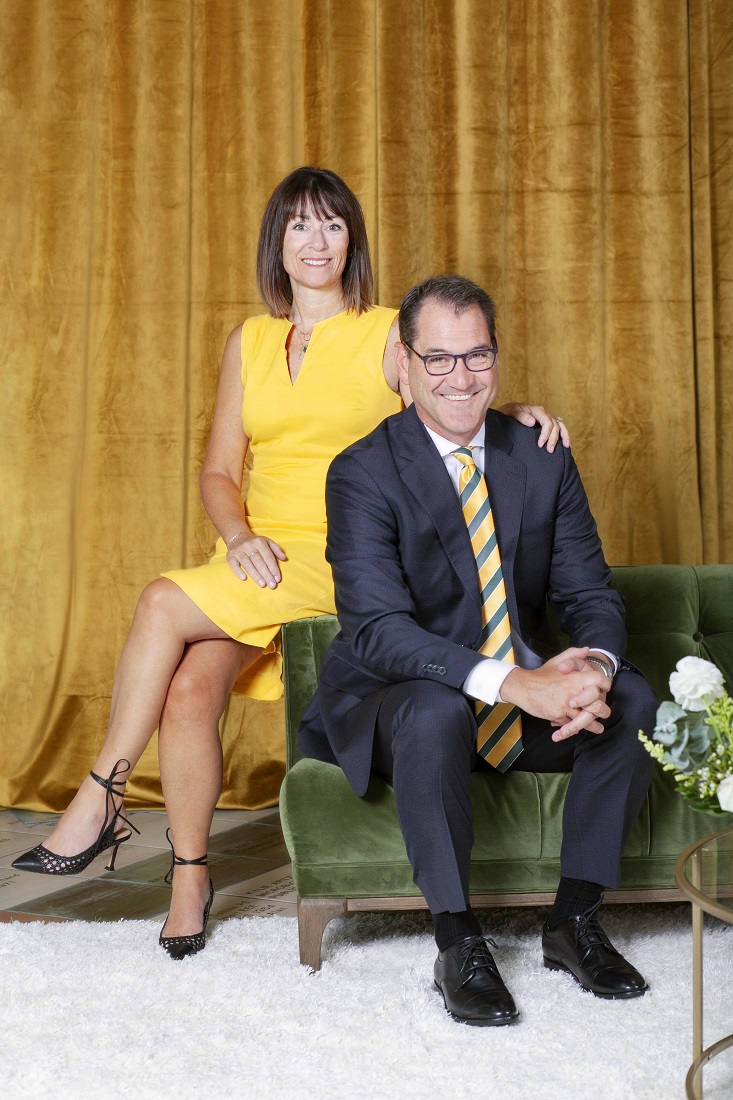
“Dave’s a great listener, and he’s passionate,” Dr. Katie Cook, the president’s wife, said. “He is going to work hard to form teams of the smartest, most capable people and work with them. Hopefully, he’ll be an amazing leader for them, but he doesn’t need to be the leader of everything. He understands that doesn’t make less of him.”
Both Katie and President Cook grew up in Ames, Iowa, home of Iowa State University where about half the city’s population is made up of college students. That highly academic environment was significant in inspiring President Cook to pursue a career in higher education.
“There’s this part of growing up in a college town that becomes part of you and gets in your DNA,” President Cook said. “You see a community that cares deeply about education and how an institution of higher education changes a community and the people in that community. I’ve grown up with that, and I think I’ve always had an affinity for being around it.”
President Cook is a proud first-generation student. He talks openly about his struggles as a freshman in college and feeling like he didn’t belong, which motivates him to do more today.
“We have examples where first-generation students, Pell-eligible students, and students of color are not progressing and retaining in ways we’d like to see,” President Cook said. “What can we do as an institution to wrap the right kinds of services around them so they can see this as a place they belong and feel important?”
With each degree earned and in every new academic experience, President Cook learned more about the nuances of higher education and programs that can help retain students and support them through graduation.
“I ran a branch campus, which gave me a good, strong taste for what being a president is about. It was a great laboratory environment because when you’re in a smaller branch campus, you must learn every element,” President Cook said. “A lot of presidents have taken a traditional path; I’ve taken a more nontraditional path, which has allowed me to understand all of these different functions.”
LAND-GRANT MISSION IN THE 21st CENTURY
During July, the president toured the state as part of NDSU’s annual Field Days. Each year, the state’s Research Extension Center sites feature speakers, presentations, and tours covering an array of topics. From July 11-21, President Cook traveled from Streeter and Hettinger to Dickinson and Williston, from Casselton to Carrington, and from Minot to Langdon. He hosted public events in Bismarck, Watford City, Wahpeton, and Grand Forks. He met with legislators, business owners, industry leaders, and North Dakotans from varying backgrounds and communities.
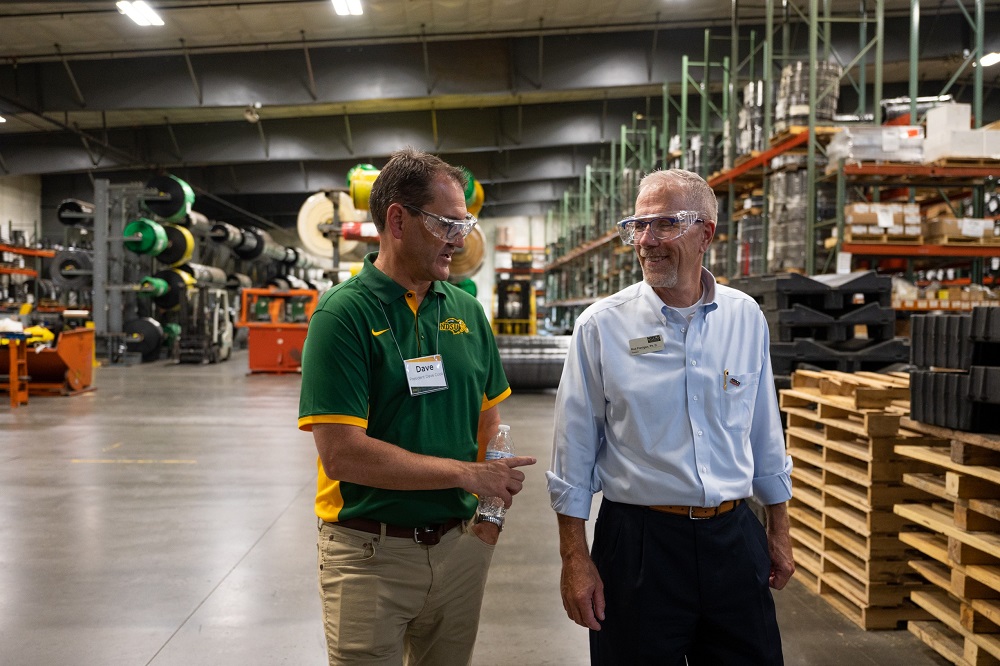
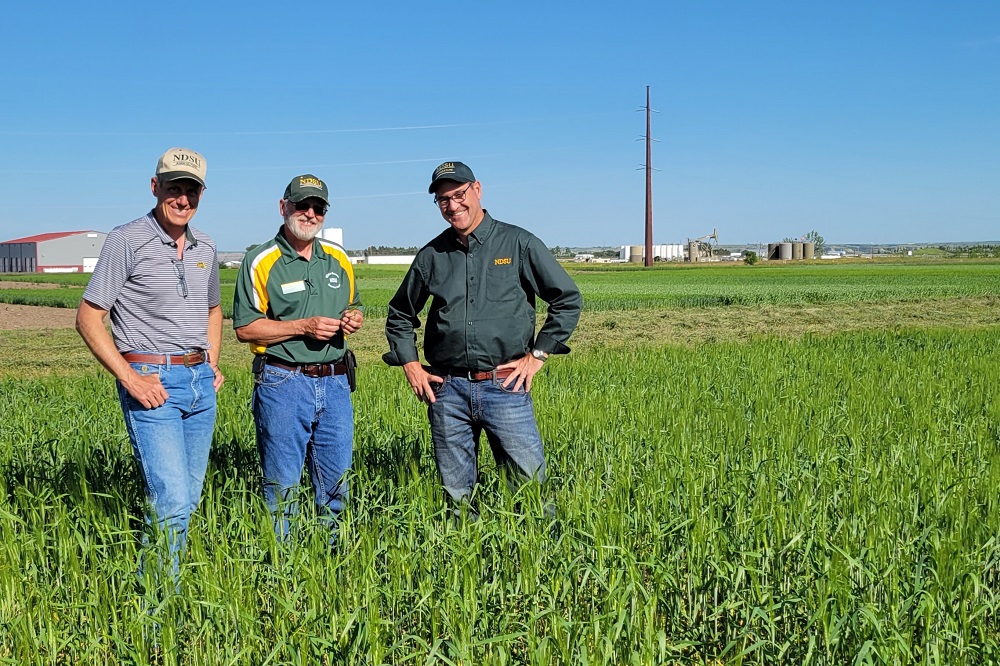
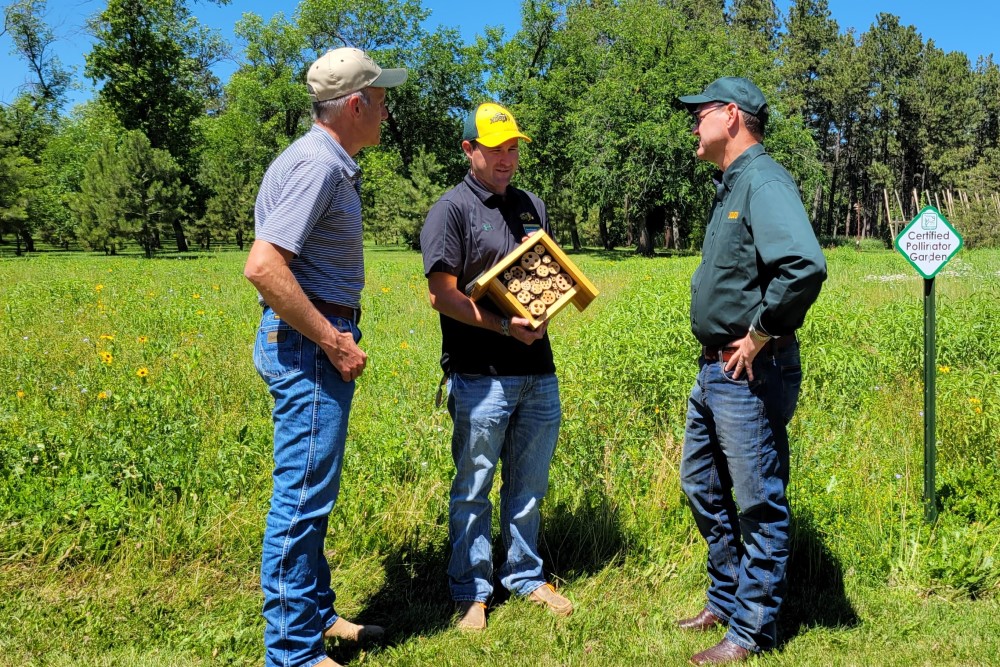
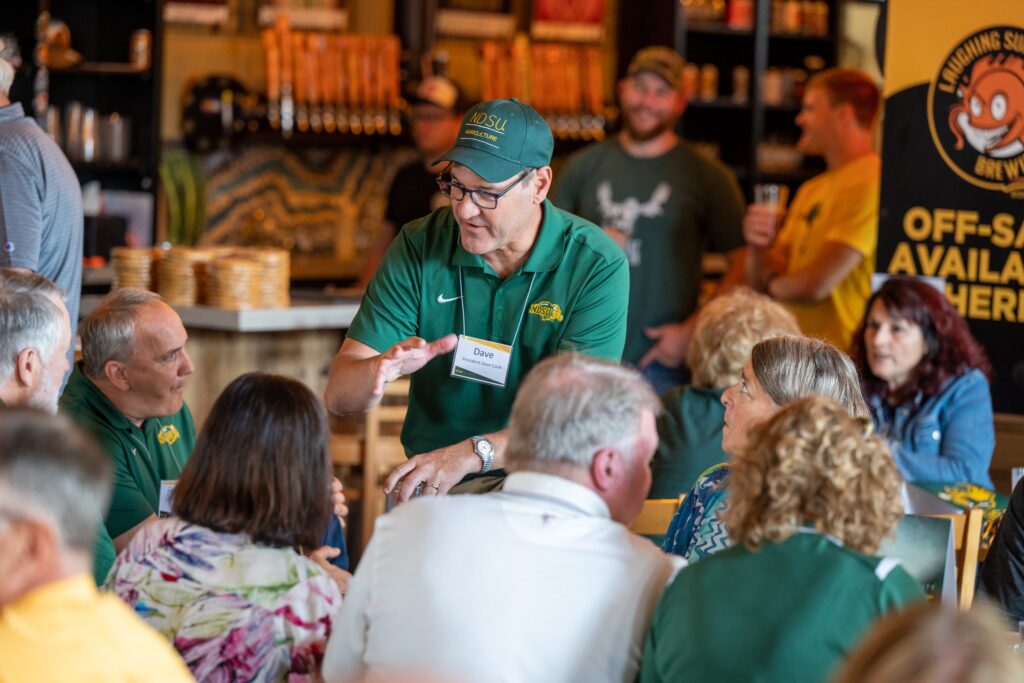
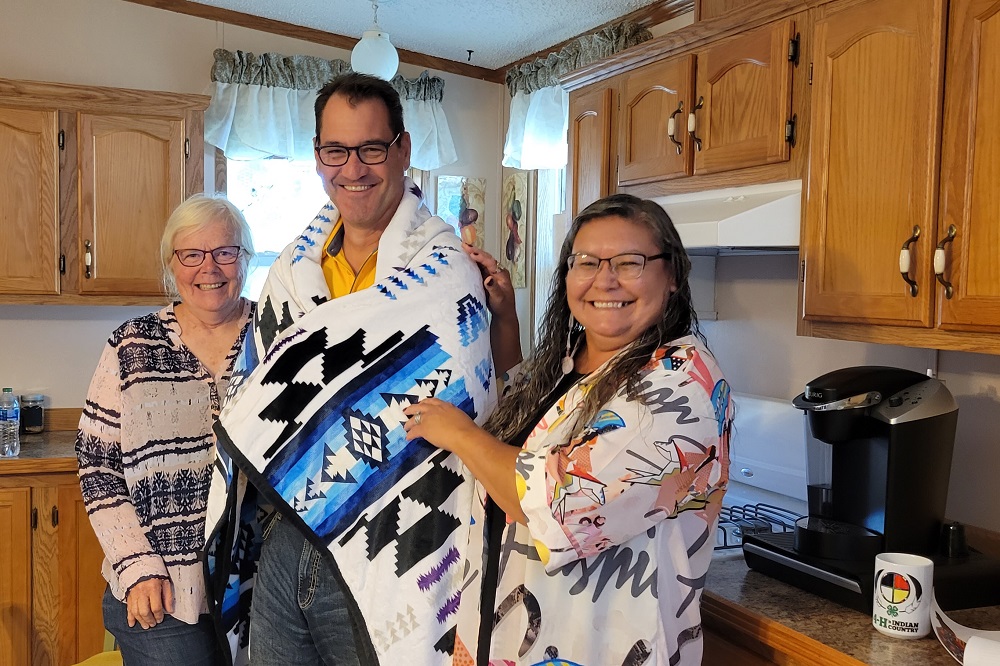

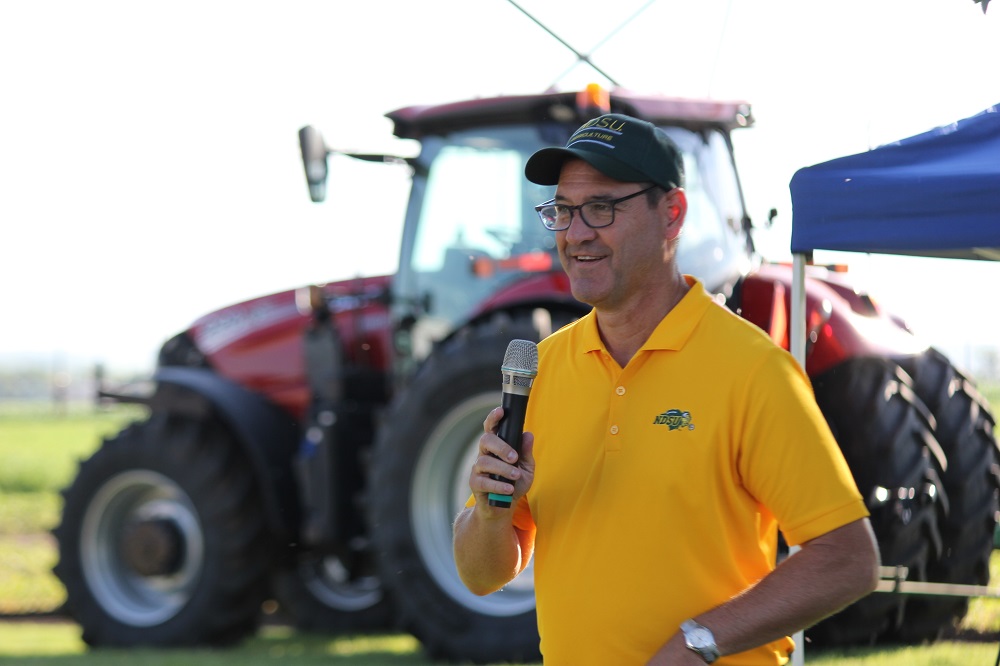
“I had the opportunity to see the diversity of the state in terms of the geography and topography and the people,” President Cook said. “I gained a deeper understanding of the land-grant mission and what agriculture, in particular, means to the many stakeholders across the state — the growers and producers and so on. There is an intimate relationship between those folks and NDSU and how we’re working together.”
The two-week tour also allowed him to witness the deep pride people have across the state for NDSU athletics.
“One of the great things about this institution is the legacy of athletics. I think what athletics does for the brand, what it does for the pride, and what it does for the institution is going to be critical,” President Cook said.
Conversations with locals and legislators expanded beyond athletics and agriculture.
"The future of NDSU ... is going to involve a lot more hands-on, experiential learning opportunities for students throughout their academic careers…"
President Cook
During his time on the road, President Cook gained a greater understanding of the value of the land-grant mission and how it can meet the needs of the state today.
“A lot of those conversations were about what we can do from an educational and research perspective to work with business and industry leaders and aligning with them for what their needs are,” the president said. “Workforce is a huge issue. We’re at a moment in time where we have a grand opportunity to think about transformation, and it’s going to happen with business and industry leaders. A lot of the tour involved listening to them about not just what they need now but really what we need tomorrow.”
Yes, industries across the state need engineers, computer scientists, and nurses, but there are also great needs for liberal arts majors — people who can think on their feet and are adaptable to technology and innovation.
“There’s still a deep interest in what I would call traditional liberal arts thinking,” President Cook said. “They want people who are critical thinkers who can think around the next turn and see what’s happening, people who are great writers, people who are great communicators, and people who know how to work in teams. That’s traditional liberal arts — people don’t use that language, but that continues to be an incredible part of what we need to have in a new, uncertain world.”
The president is also interested in exploring NDSU’s role in career technical education (CTE). He sees opportunities aligning with pharmacy, telepharmacy, and radiologic technology.
“One of the things I learned during the tour is that it’s important for us to get out across the state to listen, engage, and hear what it is that people need and want so we are truly on the cutting edge of thinking about those critical issues. That’s an incredibly important piece, especially for a land-grant university,” President Cook said. “The future of NDSU, and in higher education in North Dakota and beyond, is going to involve a lot more hands-on, experiential learning opportunities for students throughout their academic careers so that they hit the ground running and are career ready.”
In late 2021, NDSU regained an R1 designation by the Carnegie Classification of Institutions of Higher Education, an indicator that the University is operating at the highest possible level regarding research.
“NDSU being an R1 is very important,” President Cook said. “How do we invest and build the right culture to be an R1 and be one that’s excelling? Right now, we’re there and we’re proud, but we’ve got to do some things differently if we really want to take it to the next level. That’s going to be a priority.”
Being an R1, according to the president, is a north star for the University. The designation is something to strive toward and it helps recruit top faculty members whose work continues to enhance the research happening at NDSU. Success in research impacts students and staff, the region, and beyond.
THE BUSINESS OF HIGHER EDUCATION
Enrollment and revenue are major challenges facing higher education across the country; NDSU is no exception. The North Dakota Legislature factors enrollment into the funding formula for each of the state’s universities and community colleges. Enrollment and the budget go hand in hand, and it’s been widely publicized that NDSU’s enrollment has been declining. As a result, the University has seen a decrease in funding and faces a significant budget shortfall. These issues are certainly challenges, but President Cook sees opportunities within these difficulties.
"We need to be looking closely at the curricula and changing it to make sure students are prepared for where they need to go."
President Cook
In part, President Cook can see opportunity in the challenges because of the work done prior to his arrival. In early 2021, NDSU partnered with Huron Consulting Group to conduct a comprehensive Academic Program Prioritization Assessment. Over several months, Huron worked closely with the University to assess the current program portfolio, market position, and opportunities for growth to develop recommendations in support of key strategic initiatives. The final report was released in May 2021 and will be used to guide decisions moving forward.
“I’m starting to help people understand and appreciate where we’re at. We have some hard things to do this fall and next year that are critical in thinking about how we position ourselves for the future,” President Cook said as he listed issues like efficiencies, responding to the marketplace, and recruiting and investing in a workforce.
“I think a modern president has to embrace those principles. At the same time, we’re an institute of higher education that is advancing knowledge, advancing education, investing in students, and thinking about and asking hard questions that don’t have immediate answers that people can see the impact of — but maybe someday will,” the president continued. “It’s a balancing act for us to be as well-rounded as we absolutely can while being true to our mission.”
As the president begins identifying priorities for the University, philanthropic support remains crucial in enhancing the NDSU experience.
“Donor support for the University in recent years is exciting,” President Cook said. “I look forward to working with benefactors and learning more about how their passions may align with NDSU’s needs as we move forward. Philanthropy, for example, can help close the gap in areas of research and scholarships, which creates new opportunities that help get us where we need to be.”
A PLACE WHERE STUDENTS SUCCEED
Creating a place of belonging for all students is critical for the Cooks. President Cook’s experiences as a first-generation student motivate him to work at creating welcoming environments for first-generation students, Pell-eligible students, and students of color at NDSU now and in the future.
"Really thinking about student success — especially for some of our most vulnerable — creates an even better culture for us moving forward."
President Cook
Katie is an educator at heart. She holds a Ph.D., has been a special educator in K-12, and was faculty at the University of Kansas. She acts with passion and has a deep understanding of the student experience.
“I am really proud of what Katie has accomplished,” the president said. “She is compassionate and caring. The work she has done educating children with autism and/or challenging behaviors, as well as coaching fellow teachers, is incredible. I’m excited to see how she grows into this new role, and I know she’ll bring the same care and passion when working with the NDSU community.”
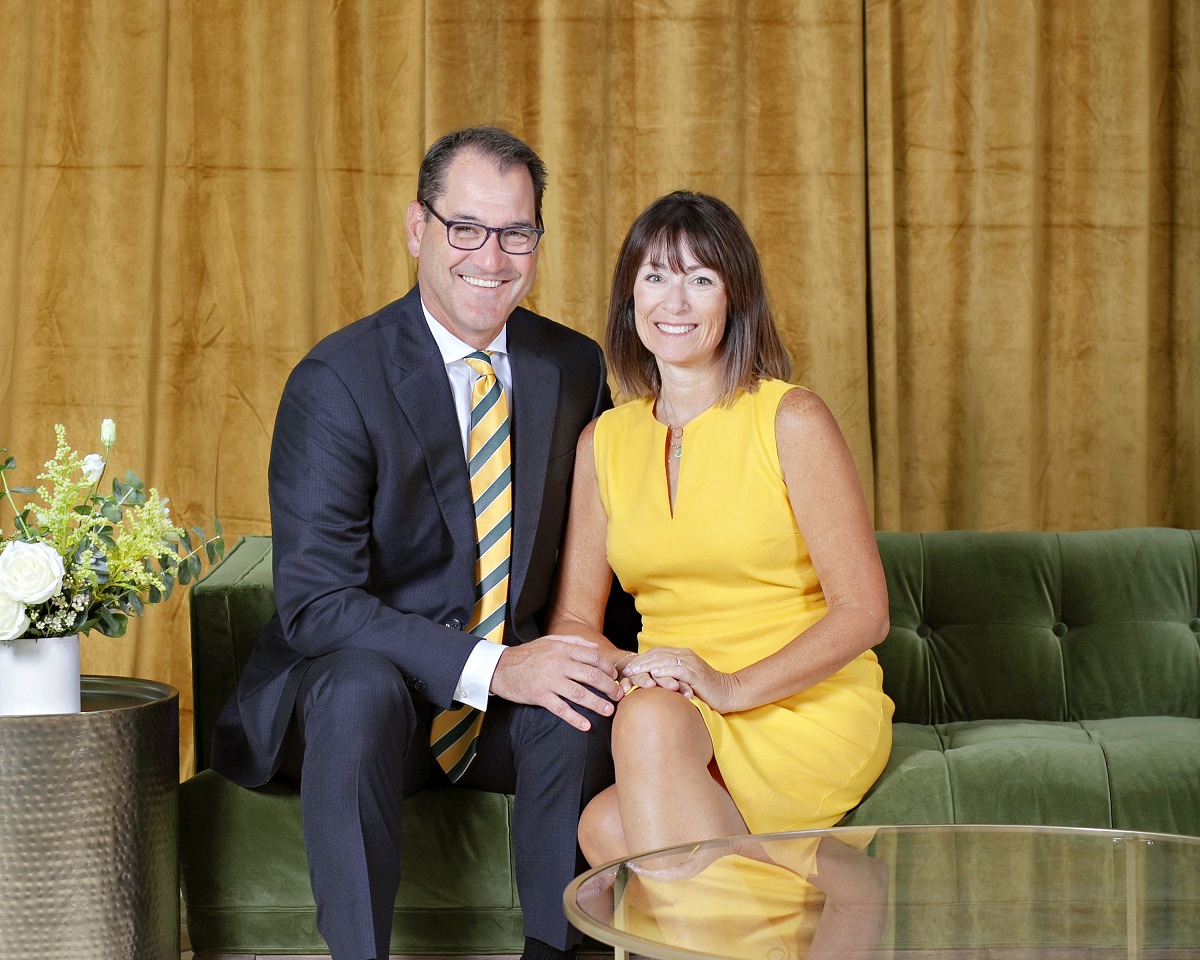
As parents, the Cooks have an appreciation for the challenges students face today. They have three children, Gage (23), Peyton (20), and Ella (19).
“They’ve grown up in a completely different world than we’re used to. There are significant challenges around mental health, and the world around us now is way different than what we dealt with as college students,” President Cook said about today’s traditional college student. “Seeing what our kids and their friends have had to deal with, what their struggles are, what’s exciting to them, how they view the world, and what they see as possibilities are a big part of helping me, I think, do this job and hopefully do it better.”
President Cook’s passion for the mission of higher education runs deep. He believes education changes lives — he looks at himself and Katie as prime examples. He also understands different students face different obstacles and the University must be responsive to meet students where they are, help them rise to the challenges they face, and get them ready for an ever-changing future.
“Really thinking about student success — especially for some of our most vulnerable — creates an even better culture for us moving forward,” the president said.
Since his official first day in office on May 17, 2022, the president has welcomed each day as an opportunity to grow his perspective. He’s embracing the challenges while focusing on what’s ahead with Midwestern grit and a positive attitude.
“This really is fun. It’s hard, but it’s fun,” President Cook said. “I am constantly learning something new about North Dakota and the University that makes me proud to be in this role.”
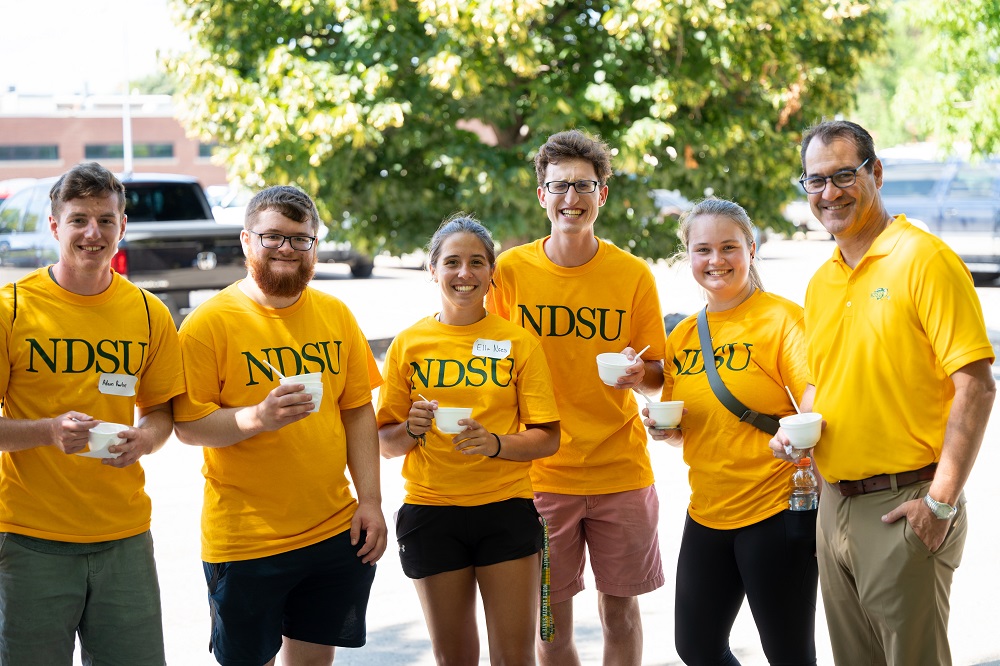
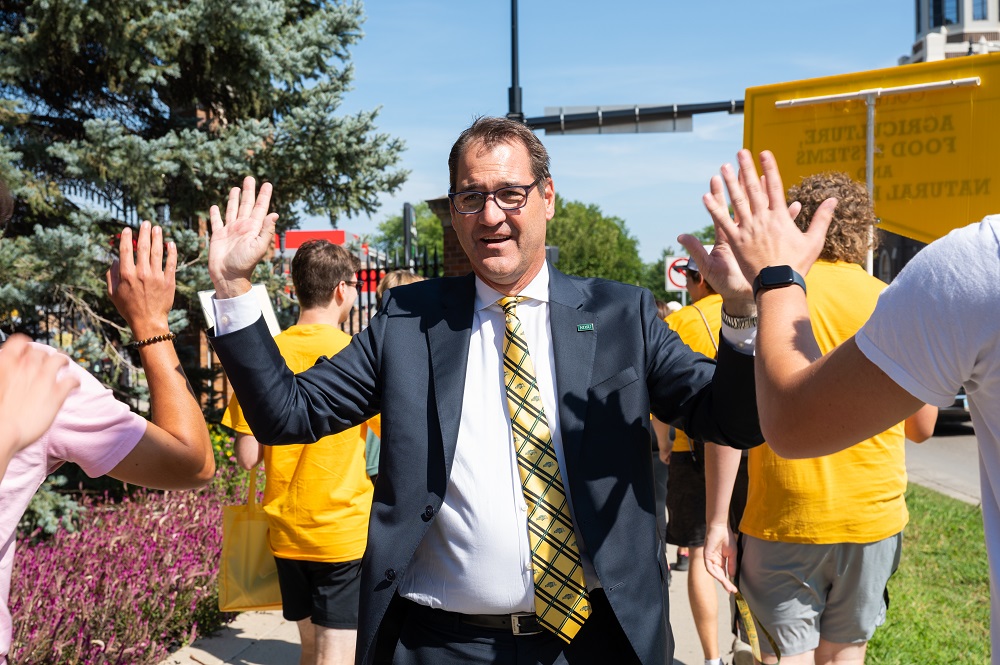
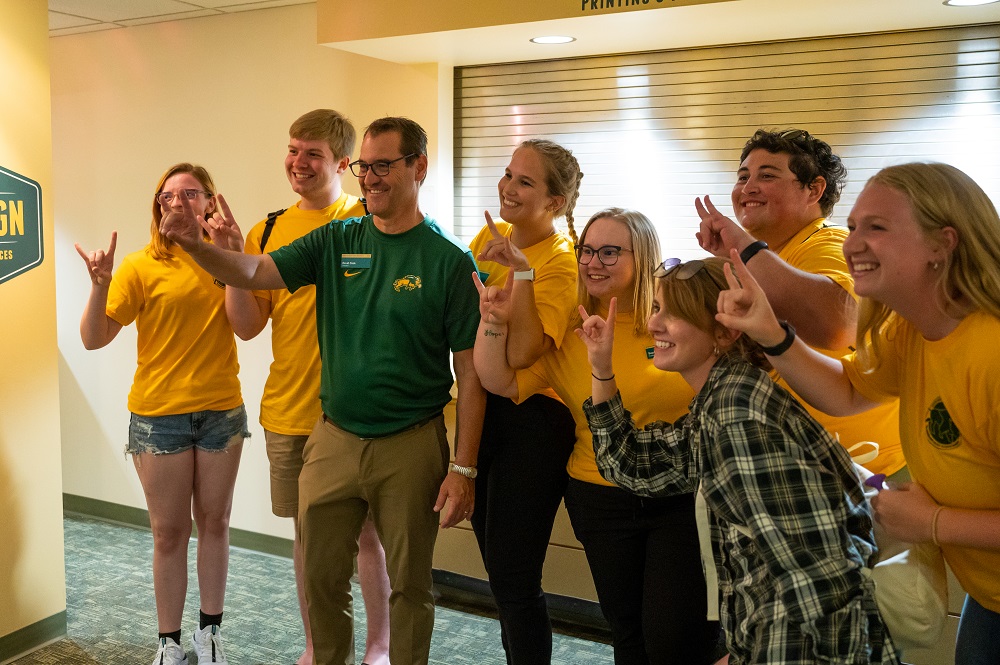
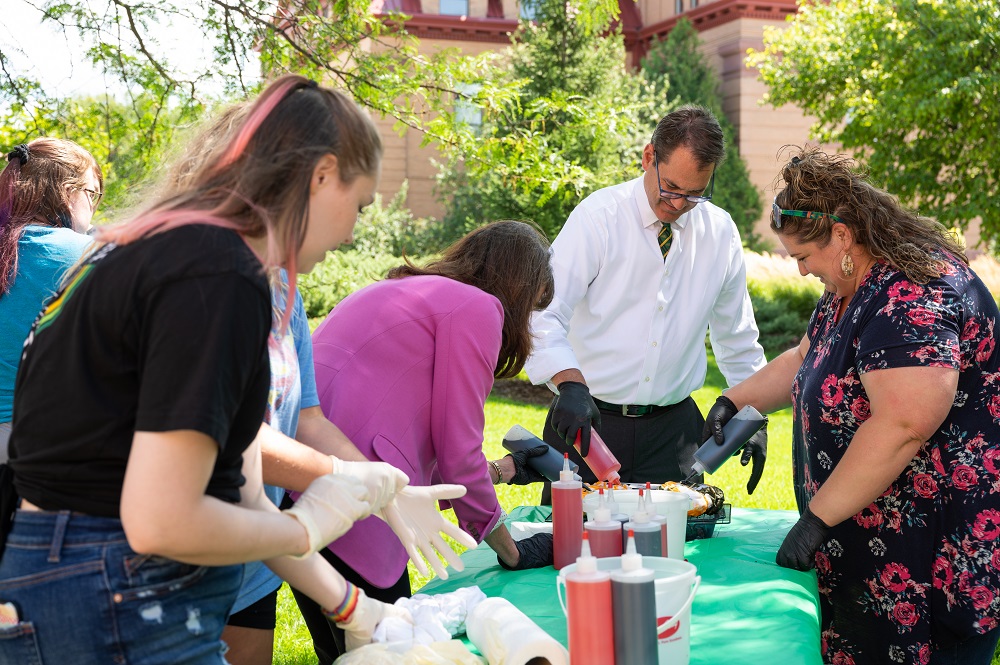
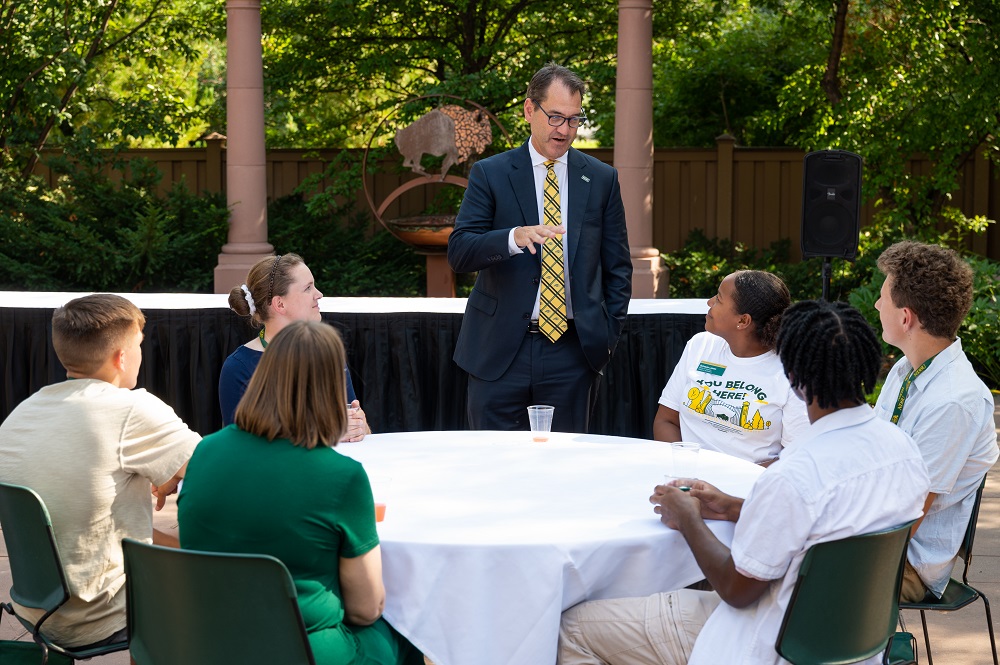
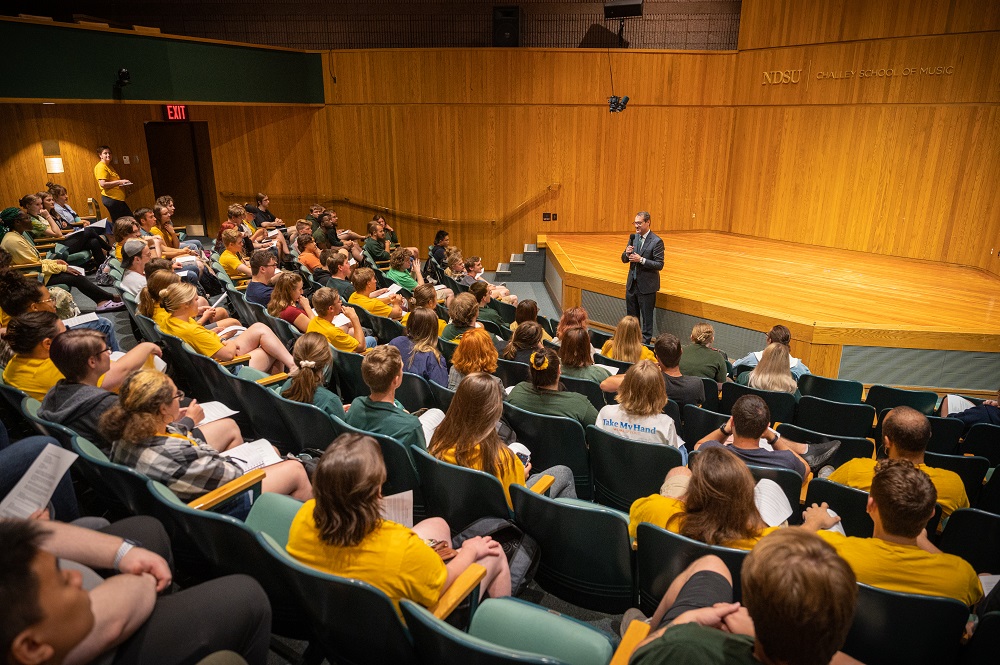
President Cook welcomed new and returning students to campus on Monday, Aug. 22, 2022. Welcome Week activities offered students opportunities to meet NDSU’s new president.
Share This Story
Related Stories
Q&A with the Cooks
NDSU President Dave Cook and Dr. Katie Cook meet with NDSU alumni and friends. They discuss their academic journeys, how parenthood influences...
Read More
